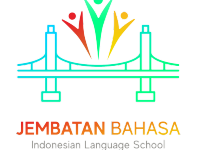As Indonesian teachers, we often get a question ‘what is the meaning of mas?’ So today’s post is dedicated to other Indonesian learners out there who might have the same question.
The meaning of mas is ‘older brother/bro’. It drives from Javanese language, but it is used national wide. It’s known across the country because it is already in the official Indonesian dictionary, and Javanese people are everywhere!
How to use mas
If you are a foreigner in Indonesia, you can use ‘mas’ to address:
- men who are older than you (normally unmarried). You can their first name after the form of address, for example:
Mas Bejo apa kabar? (How are you Bro Bejo?)
- male strangers whom you don’t know their names of
Instead of address men with ‘Anda’ (formal you) or ‘kamu’ (informal you), it’s considered more polite and natural to use mas. For example:
Siapa nama mas? (what is your name?)
- younger men with higher status
Supposed you have a male boss or a teacher who is younger than you, you can address them with mas. Most Indonesians will be okay with this, but you want to address them with Bapak/Pak (Mr. /Sir) first. If they are uncomfortable, they we will let you know – Panggil saya mas saja (please call me mas).
Other forms of address
Other than mas, there are some other forms of address in Indonesian. Like mas, these words below can be used to replaced Anda or kamu.
| Bapak/Pak | For married men/respected men |
| Ibu/Bu | For married women/respected women |
| Mas | Unmarried men (derived from Javanese) |
| Mbak | Unmarried women (derived from Javanese) |
Form of address in local languages
As mentioned earlier the definition of mas is older brother in Javanese. Javenese people find this word close to their heart, but for other ethnic groups in Indonesia, it is not so much. Therefore, it’s important to learn other forms of address depending on where you travel in the country. Have a look at the table below.
| Forms of Address | Literal Meaning | Used in |
| Bli | Older brother | Bali |
| Mbok | Older sister | |
| Kakang/Kang | Older brother | Sunda (West Java) |
| Teteh/Teh | Older sister | |
| Kakak/Kak | Older brother/sister | Papua, East Nusa Tenggara |
| Abang/bang | Older brother | Jakarta |
| Eneng/neng | Older sister |
There are obviously a lot more as Indonesia has more than 300 ethnic groups and a lot of them have different forms of address. A good rule of thumb is always address people with Bapak or Ibu, then follow whatever names they’d like you to call them.
More explanation in video here:
Conclusion on ‘meaning of mas’
We hope you have a better understanding with the form of address ‘mas’ and will be able to use it in Indonesia. When in doubt, remember to use Bapak or Ibu first, then follow their preferences. In general, Indonesians are tolerable if foreigners make mistakes so just relax and enjoy your time in Indonesia.
